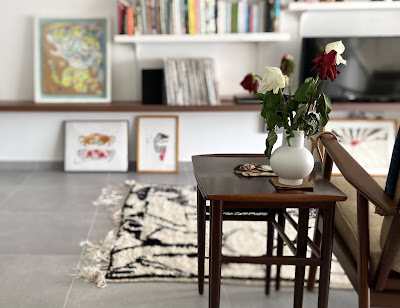 |
| Roses, they wilt so quickly! What are days?! |
Today I wish to introduce the poetry of Marianne Moore. Marianne who?
The thing with poetry is that it is full of men! Don't get me wrong, I love men, but why are the women in poetry still often seen as minor figures? Because they are not obstinate enough? Because they are not difficult? Because they are not "intellectual" or "political" but "domestic"? Because they are not... Or only when they are sarcastic and philandering - like bad stereotypes of men - or else, "neurotic" as one expects of women.
Rant over.
Marianne Moore (1887-1972) was a poet's poet: worshipped for her innovation, intelligence, rigor. Her poetry is tough yet intricate. Her personal life was uncontroversial. She was friends with contemporaries Wallace Steven (insurance executive in the day) and Ezra Pound. She detested and spoke against the fascism he was drawn to, and was also vocal in the suffrage movement. She was a student of politics and history, but also histology and biology. And so her poems speak of nations but more than half her poems are, on the surface, about animals...and also seemingly random things and places.
I think of her poems as intelligent but also, ultimately, ethical. They are of concrete, observable things. But she is also actually writing about the spirit and the nature of truth. If you tried reading her poems aloud, you will stumble on the words - the words are hard hitting and multi-syllabic; the line and paragraph breaks are unexpected; and the rhymes (as with the humour) are internal and subtle. It is as if she wants you to savour each word as a thing, to struggle with the language, and in the struggle, arrive at the truth. I think of her poems as puzzles.
You must be scared by now.
In view of PM Lee's speech this afternoon, I would have liked to share her poem "The Animals Sick of the Plague" (1954) for how it may speak of our times. But it is too long.
So I share this poem that is one of her, I think, "more accessible" and well known poems. There is no dense imagery. This poem was published in 1941: so imagine a world where fascism is about to seize Europe; America seems a by-stander but it is constantly pulled into the debates - political, philosophical, aesthetic, scientific.... It is still very relevant to our times when, amidst crisis and disease, we are made aware of our mortality.
I interpret this poem as asking: how do you exist in your time?
It seems to say that we cannot be apathetic or indifferent to what is around us - all of us are "naked, none is safe". And because our realities are complex, the human soul must be bravely free. So even as you doubt and question and face the final unknown (i.e. death), and struggle, the soul becomes stronger not by avoiding but "surrendering" to one's mortality. And in that, stand and speak (or better still, sing!) - even if we are all, in some ways, imprisoned or "captive" in our bodies, our situations, our world. It is interesting that she ends this poem to give us the reward that is simply "joy" - joy in our mortality, and joy that is eternity.
Is this not a tough but absolutely pure and beautiful poem?
What are years?
What is our innocence,
what is our guilt? All are
naked, none is safe. And whence
is courage: the unanswered question,
the resolute doubt, -
dumbly calling, deafly listening - that
is misfortune, even death
encourages others
and in its defeat, stirs
the soul to be strong? He
sees deep and is glad, who
accedes to mortality
and in his imprisonment rises
upon himself as
the sea in a case, struggling to be
free and unable to be,
in its surrendering
finds its continuing.
So he who strongly feels,
behaves. The very bird,
grown taller as he sings, steels
its form straight up. Though he is captive,
his mighty singing
says, satisfaction is a lowly
thing, how pure a thing is joy.
This is mortality,
this is eternity.
Comments